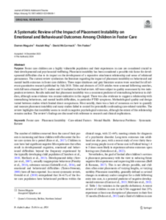Abstract:
Purpose:
Foster care children are a highly vulnerable population and their experiences in care are considered crucial to their developmental and psychosocial wellbeing. Placement instability has been considered a possible risk factor for developmental difficulties due to its impact on the development of a reparative attachment relationship and sense of relational permanence. The current review synthesizes the literature regarding the impact of placement instability on behavioural and mental health outcomes in foster care children. Three major databases and grey literature sources were searched for all relevant quantitative research published by July 2019.
Titles and abstracts of 2419 articles were screened following searches, with full texts obtained for 51 studies and 14 included in the final review. All were subject to quality assessment by two independent reviewers. Results indicated that placement instability was a consistent predictor of externalising behaviour in children, although some evidence was counter-indicative in this regard. There was also evidence to suggest a relationship with internalising behaviours, and mental health difficulties, in particular PTSD symptoms.
Methodological quality and design varied between studies which limited direct comparisons. Most notably, there was a lack of consensus on how to quantify and measure placement instability and many studies failed to control for potentially confounding care-related variables.
The review highlights that instability seems to result in negative psychological outcomes, although the extent of this relationship remains unclear. The review’s findings are discussed with reference to research and clinical implications

